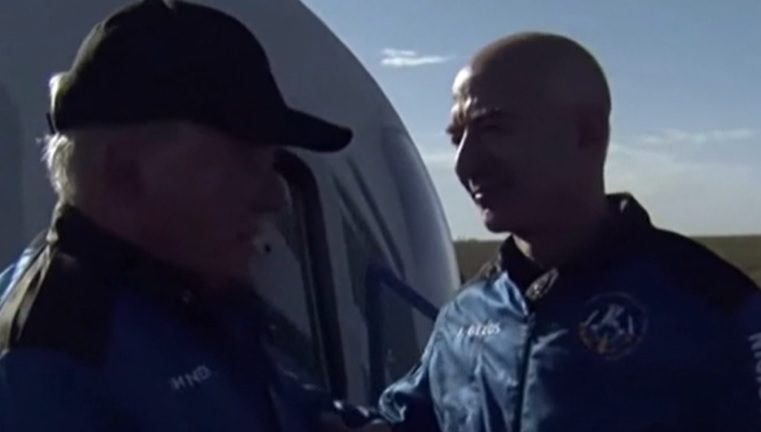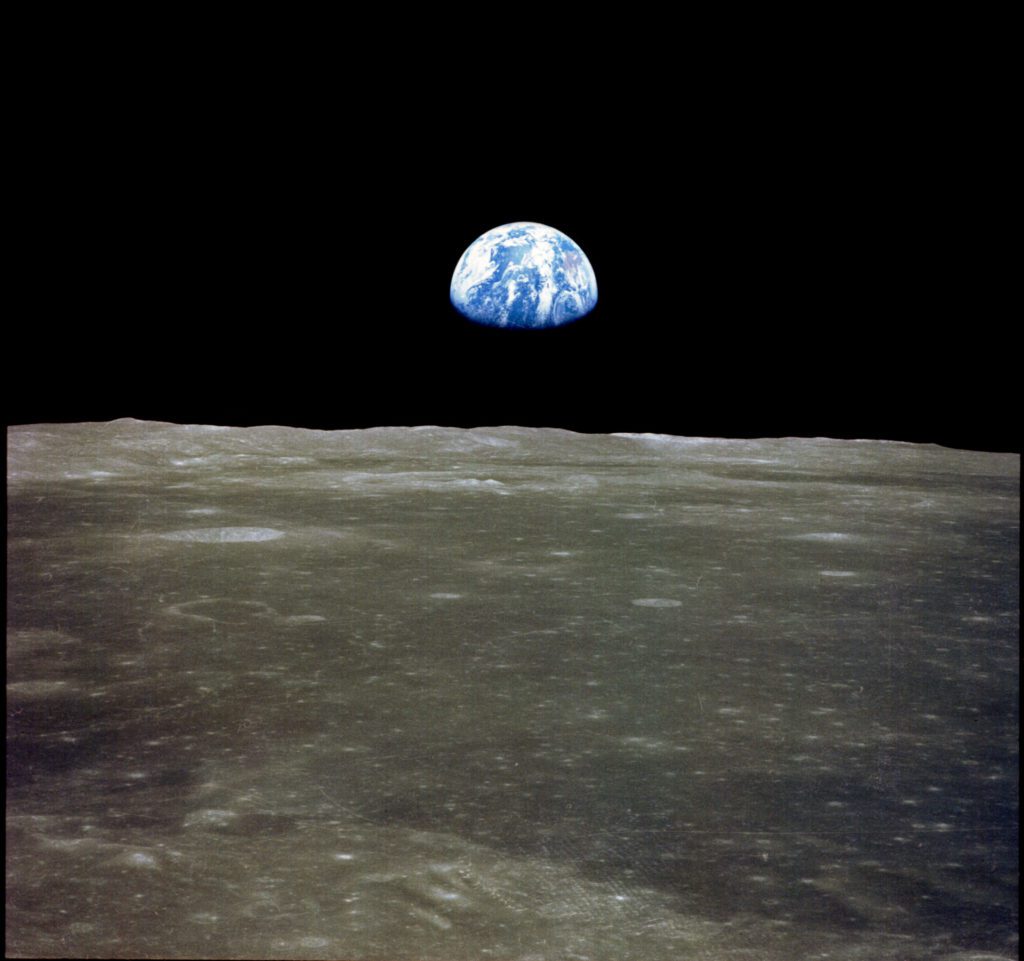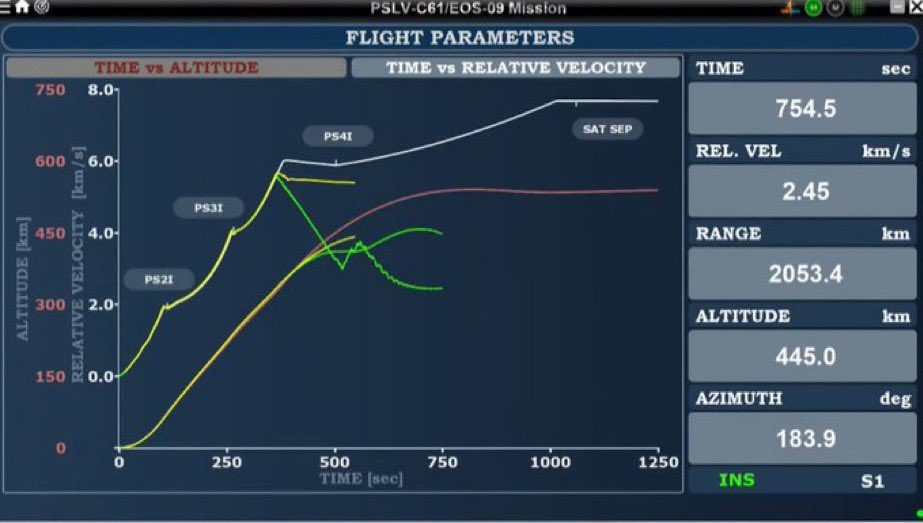William Shatner, the Canadian-born actor who played Captain James T. Kirk in the Star Trek TV and film series, finally got his wish to make it into space. He flew with three others above the “Karman line”, the official 100 km limit that marks space, aboard the reusable Blue Origin New Shepard suborbital launch vehicle, which lifted off at 1459 GMT on 13 October 2021. In doing so, the stout but fit looking 90-year-old became the oldest man to boldly venture into space.

“Captain Kirk” actor William Shatner expresses his emotional thanks to Jeff Bezos. Courtesy: Blue Origin
Shatner and his fellow space travellers experienced the exhilaration of the rocket ride followed by a two-minute period of “weightlessness”. They also managed to see the curvature of the Earth and its atmospheric delineator through the capsule’s large windows before returning to their seats for re-entry and a parachute/rocket-braked landing about ten minutes after launch.
Shatner was evidently moved by his New Shepard NS-18 trip. As he left the capsule he was welcomed by Jeff Bezos, the Amazon billionaire and founder of the Blue Origin spaceflight company. A tearful Shatner said to Bezos: “What you have given me is the most profound experience. I’m so filled with emotion about what just happened. I hope I never recover from this. I hope I can retain what I feel now. I don’t want to lose it.”
His Royal Highness Prince William (aka the Duke of Cambridge) used the timing of the Blue Origin New Shepard suborbital launch to lash out at the concept of space tourism and space exploration in general.
During a BBC interview Prince William, a former RAF search and rescue helicopter pilot, refuted a suggestion that he would one day like to fly in space, and questioned whether space tourism was environmentally sustainable because of the carbon emissions. He also noted that there were better, more environmentally friendly ways to spend the Earth’s financial resources and intellectual effort.
“We need some of the world’s greatest brains and minds fixed on trying to repair this planet, not trying to find the next place to go and live,” he said.
This remark was taken by many as a critical barb against the technology billionaires engaged in driving modern space activity: Blue Origin’s Jeff Bezos, Virgin Galactic’s Sir Richard Branson and SpaceX’s Elon Musk, even though the last can probably defend himself given his development efforts in solar power generation and electric (Tesla) cars.
Update on 15 October 2021: After hearing of Prince William’s criticisms, “Captain Kirk” fired his own “photon torpedo” back by saying that the Prince “is a lovely, gentle, educated man but he’s got the wrong idea” abut space. Shatner explained that space research might yield new non-polluting energy sources such as solar-powered orbital solar power stations. Others in the space industry have made similar criticisms of the prince’s comments.
Comment by David Todd: Prince William made his critical remarks ahead of the award of the first Earthshot Prizes to those coming up with new technologies and schemes to help save the environment. He must be aware of the irony of naming the environmental prize he was promoting “Earthshot”, which echoes “Moonshot” – the nickname for the Apollo human lunar landing programme. However, one wonders if he appreciates that it was also the beautiful photographic imagery of Earth taken by Apollo astronauts (initially by Apollo 8) that became a driving force behind the start of environmentalism in the late 1960s.
It is also true that while it was not planned as such, space technology developed in the military-industrial space race of the 1960s has since provided one of the main ways for humans to monitor Earth’s environment. To a large extent it was down to satellite measurements that Earth’s temperature rise was proven and its effects monitored. And it was this that flagged up the imminent threat of global warming and climate change.
And yet, Prince William is partly right. Suborbital space tourism is just a trivial fad for the rich to waste their money on – and a very poor value one at that. Passengers pay several hundred thousand dollars for a very short 10 minutes of rocket ride, even if it is apparently fun (Shatner’s ride was a free trip, by the way).
Likewise, longer range, whatever Elon Musk might say about its appropriateness for a new human colony, the planet Mars is about as hospitable as the Nevada desert. And given its low atmospheric pressure and lack of vegetation (not even cacti), it is even less so. Even the Nevada desert does have one thing to attract human visitors: the gambling and entertainment den of Las Vegas. However, an initial human exploration trip to the planet aside, it is unlikely that many would ever want to take nine months getting to Mars, even if a Las Vegas-style resort was there, let alone a very basic space colony.
Having said that, the Moon, which the likes of Elon Musk and Jeff Bezos are also aiming at, is much closer to home and does offer a place for important space and astronomical research. It could even provide a kind of insurance for the human species’ survival – if a lunar surface base or a small human colony could be set up there.
In addition, Earth’s natural satellite has minable mineral deposits and its gravity gives it a significant extraction-ease advantage over asteroids. The Moon’s regolith might even give humankind a fossil-free on-demand energy source if lunar Helium-3 deposits can offer a route to clean, cost-effective, nuclear fusion.
Finally, one suspects that there might be significant demand for lunar space tourism, if lunar hotels and space transportation links could be created in a cost-effective fashion. This could also provide an indirect psychological benefit to Earth’s environmental cause. Like the Apollo programme’s Earthrise photographs, the Moon’s cold grey “magnificent desolation”, as Apollo 11 astronaut Buzz Aldrin famously described it, might be all it takes to show to rich movers and shakers of this world where the true beauty lies: our lovely blue planet Earth. And this really does need to be protected.








